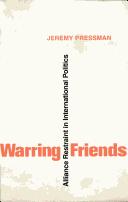| Listing 1 - 5 of 5 |
Sort by
|

ISBN: 0801467128 0801474434 0801464943 9780801464942 0801446716 9780801446719 9780801474439 9780801467127 1322504075 Year: 2008 Publisher: Ithaca : Cornell University Press,
Abstract | Keywords | Export | Availability | Bookmark
 Loading...
Loading...Choose an application
- Reference Manager
- EndNote
- RefWorks (Direct export to RefWorks)
Allied nations often stop each other from going to war. Some countries even form alliances with the specific intent of restraining another power and thereby preventing war. Furthermore, restraint often becomes an issue in existing alliances as one ally wants to start a war, launch a military intervention, or pursue some other risky military policy while the other ally balks. In Warring Friends, Jeremy Pressman draws on and critiques realist, normative, and institutionalist understandings of how alliance decisions are made.Alliance restraint often has a role to play both in the genesis of alliances and in their continuation. As this book demonstrates, an external power can apply the brakes to an incipient conflict, and even unheeded advice can aid in clarifying national goals. The power differentials between allies in these partnerships are influenced by leadership unity, deception, policy substitutes, and national security priorities. Recent controversy over the complicated relationship between the U.S. and Israeli governments-especially in regard to military and security concerns-is a reminder that the alliance has never been easy or straightforward.Pressman highlights multiple episodes during which the United States attempted to restrain Israel's military policies: Israeli nuclear proliferation during the Kennedy Administration; the 1967 Arab-Israeli War; preventing an Israeli preemptive attack in 1973; a small Israeli operation in Lebanon in 1977; the Israeli invasion of Lebanon in 1982; and Israeli action during the Gulf War of 1991. As Pressman shows, U.S. initiatives were successful only in 1973, 1977, and 1991, and tensions have flared up again recently as a result of Israeli arms sales to China.Pressman also illuminates aspects of the Anglo-American special relationship as revealed in several cases: British nonintervention in Iran in 1951; U.S. nonintervention in Indochina in 1954; U.S. commitments to Taiwan that Britain opposed, 1954-1955; and British intervention and then withdrawal during the Suez War of 1956. These historical examples go far to explain the context within which the Blair administration failed to prevent the U.S. government from pursuing war in Iraq at a time of unprecedented American power.
International relations. --- War --- Conflict management --- Deterrence (Strategy) --- Alliances. --- Coexistence --- Foreign affairs --- Foreign policy --- Foreign relations --- Global governance --- Interdependence of nations --- International affairs --- Peaceful coexistence --- World order --- National security --- Sovereignty --- World politics --- Armed conflict (War) --- Conflict, Armed (War) --- Fighting --- Hostilities --- Wars --- International relations --- Military art and science --- Peace --- Military policy --- Psychology, Military --- Strategy --- First strike (Nuclear strategy) --- Nuclear crisis stability --- Alliances --- Treaties of alliance --- Treaties --- Prevention --- International cooperation. --- Law and legislation --- United States --- ABŞ --- ABSh --- Ameerika Ühendriigid --- America (Republic) --- Amerika Birlăshmish Shtatlary --- Amerika Birlăşmi Ştatları --- Amerika Birlăşmiş Ştatları --- Amerika ka Kelenyalen Jamanaw --- Amerika Qūrama Shtattary --- Amerika Qŭshma Shtatlari --- Amerika Qushma Shtattary --- Amerika (Republic) --- Amerikai Egyesült Államok --- Amerikanʹ Veĭtʹsėndi︠a︡vks Shtattnė --- Amerikări Pĕrleshu̇llĕ Shtatsem --- Amerikas Forenede Stater --- Amerikayi Miatsʻyal Nahangner --- Ameriketako Estatu Batuak --- Amirika Carékat --- AQSh --- Ar. ha-B. --- Arhab --- Artsot ha-Berit --- Artzois Ha'bris --- Bí-kok --- Ē.P.A. --- EE.UU. --- Egyesült Államok --- ĒPA --- Estados Unidos --- Estados Unidos da América do Norte --- Estados Unidos de América --- Estaos Xuníos --- Estaos Xuníos d'América --- Estatos Unitos --- Estatos Unitos d'America --- Estats Units d'Amèrica --- Ètats-Unis d'Amèrica --- États-Unis d'Amérique --- Fareyniḳṭe Shṭaṭn --- Feriene Steaten --- Feriene Steaten fan Amearika --- Forente stater --- FS --- Hēnomenai Politeiai Amerikēs --- Hēnōmenes Politeies tēs Amerikēs --- Hiwsisayin Amerikayi Miatsʻeal Tērutʻiwnkʻ --- Istadus Unidus --- Jungtinės Amerikos valstybės --- Mei guo --- Mei-kuo --- Meiguo --- Mî-koet --- Miatsʻyal Nahangner --- Miguk --- Na Stàitean Aonaichte --- NSA --- S.U.A. --- SAD --- Saharat ʻAmērikā --- SASht --- Severo-Amerikanskie Shtaty --- Severo-Amerikanskie Soedinennye Shtaty --- Si︠e︡vero-Amerikanskīe Soedinennye Shtaty --- Sjedinjene Američke Države --- Soedinennye Shtaty Ameriki --- Soedinennye Shtaty Severnoĭ Ameriki --- Soedinennye Shtaty Si︠e︡vernoĭ Ameriki --- Spojené staty americké --- SShA --- Stadoù-Unanet Amerika --- Stáit Aontaithe Mheiriceá --- Stany Zjednoczone --- Stati Uniti --- Stati Uniti d'America --- Stâts Unîts --- Stâts Unîts di Americhe --- Steatyn Unnaneysit --- Steatyn Unnaneysit America --- SUA (Stati Uniti d'America) --- Sŭedineni amerikanski shtati --- Sŭedinenite shtati --- Tetã peteĩ reko Amérikagua --- U.S. --- U.S.A. --- United States of America --- Unol Daleithiau --- Unol Daleithiau America --- Unuiĝintaj Ŝtatoj de Ameriko --- US --- USA --- Usono --- Vaeinigte Staatn --- Vaeinigte Staatn vo Amerika --- Vereinigte Staaten --- Vereinigte Staaten von Amerika --- Verenigde State van Amerika --- Verenigde Staten --- VS --- VSA --- Wááshindoon Bikéyah Ałhidadiidzooígíí --- Wilāyāt al-Muttaḥidah --- Wilāyāt al-Muttaḥidah al-Amirīkīyah --- Wilāyāt al-Muttaḥidah al-Amrīkīyah --- Yhdysvallat --- Yunaeted Stet --- Yunaeted Stet blong Amerika --- ZDA --- Združene države Amerike --- Zʹi︠e︡dnani Derz︠h︡avy Ameryky --- Zjadnośone staty Ameriki --- Zluchanyi︠a︡ Shtaty Ameryki --- Zlucheni Derz︠h︡avy --- ZSA --- Η.Π.Α. --- Ηνωμένες Πολιτείες της Αμερικής --- Америка (Republic) --- Американь Вейтьсэндявкс Штаттнэ --- Америкӑри Пӗрлешӳллӗ Штатсем --- САЩ --- Съединените щати --- Злучаныя Штаты Амерыкі --- ولايات المتحدة --- ولايات المتّحدة الأمريكيّة --- ولايات المتحدة الامريكية --- 미국 --- Spojené obce severoamerické --- États-Unis --- É.-U. --- ÉU
Book
ISBN: 1526146169 1526150050 9781526150059 1526146177 9781526146175 Year: 2020 Publisher: Manchester : Manchester University Press,
Abstract | Keywords | Export | Availability | Bookmark
 Loading...
Loading...Choose an application
- Reference Manager
- EndNote
- RefWorks (Direct export to RefWorks)
In this lucid and timely new book, Jeremy Pressman demonstrates that the default use of military force on both sides of the Arab-Israeli conflict has prevented its peaceful resolution. Whether called deterrence or war, armed struggle or terrorism, the history of the conflict reveals that violence has been counterproductive. Drawing on historical evidence from the 1950s to the present, The sword is not enough pushes back against the dominant belief that military force leads to triumph while negotiations and concessions lead to defeat and further unwelcome challenges. Violence weakens the security situation, bolsters adversaries, and, especially in the case of Palestine, has sabotaged political aims. Studiously impartial and accessibly written, this book shows us that diplomacy is the only answer.
Arab-Israeli conflict. --- Political violence --- Conflict resolution. --- Diplomacy. --- Israel. --- Military force. --- Negotiations. --- Palestine. --- Peace. --- US foreign policy. --- War.
Digital
ISBN: 9780801464942 Year: 2011 Publisher: Ithaca, N.Y. Cornell University Press
Abstract | Keywords | Export | Availability | Bookmark
 Loading...
Loading...Choose an application
- Reference Manager
- EndNote
- RefWorks (Direct export to RefWorks)

ISBN: 0870030213 Year: 1997 Publisher: Washington (D.C.) : Carnegie endowment for international peace,
Abstract | Keywords | Export | Availability | Bookmark
 Loading...
Loading...Choose an application
- Reference Manager
- EndNote
- RefWorks (Direct export to RefWorks)
Book

ISBN: 9781538172032 1538172038 9781538172025 Year: 2023 Publisher: Lanham : Rowman & Littlefield,
Abstract | Keywords | Export | Availability | Bookmark
 Loading...
Loading...Choose an application
- Reference Manager
- EndNote
- RefWorks (Direct export to RefWorks)
"The October 1973 Middle East War transformed the region's politics and had a huge impact on the international political system as a whole. Arguments about the causes, effects, and meaning of the war and about why it ran its course as it did have played a key role in shaping the understanding of the Arab-Israeli conflict, of American policy in the Middle East, and many other major issues. For the 50th anniversary of the war, this book grapples with these issues in an objective way by using the mass of declassified material that has recently become available."
| Listing 1 - 5 of 5 |
Sort by
|

 Search
Search Feedback
Feedback About UniCat
About UniCat  Help
Help News
News